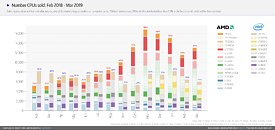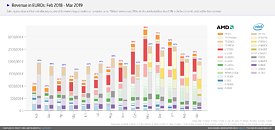Tuesday, April 9th 2019

AMD Outsells Intel 2:1 on European Retailer Mindfactory.de
European PC enthusiasts continue to see value in choosing AMD Ryzen processors over Intel Core, as the latest public data by German retailer Mindfactory.de, which ships across the EU, shows AMD processors outselling Intel 2:1. Although earlier Intel would have the upperhand in revenue despite lower volumes, this time around, AMD shored up revenues on the backs of high-margin products such as the Ryzen 7 2700X and the HEDT Ryzen Threadripper series.
The 6-core/12-thread Ryzen 5 2600 is the most popular processor offering high value under the 200€-mark. It is followed by the 8-core/16-thread Ryzen 7 2700X. Buyers prefer the 2700X to the cheaper 2700 non-X. The Ryzen 5 2600X is another strong seller. Over in the Intel camp, the Core i9-9900K and Core i7-9700K are strong sellers, followed by the i5-9600K and the newly released i5-9400F. Pricing graphs show Intel processor pricing steadily rise over 2018, while AMD chips remained largely flat. These numbers are not indicative of the overall market, since Mindfactory caters to DIY PC gamers and enthusiasts only.
Source:
ExtremeTech
The 6-core/12-thread Ryzen 5 2600 is the most popular processor offering high value under the 200€-mark. It is followed by the 8-core/16-thread Ryzen 7 2700X. Buyers prefer the 2700X to the cheaper 2700 non-X. The Ryzen 5 2600X is another strong seller. Over in the Intel camp, the Core i9-9900K and Core i7-9700K are strong sellers, followed by the i5-9600K and the newly released i5-9400F. Pricing graphs show Intel processor pricing steadily rise over 2018, while AMD chips remained largely flat. These numbers are not indicative of the overall market, since Mindfactory caters to DIY PC gamers and enthusiasts only.



105 Comments on AMD Outsells Intel 2:1 on European Retailer Mindfactory.de
no wonder mindfactory is getting 2:1 sales,they're selling 9600K at +1.4x 2600x price.at that ratio I'm curious about whoever buys any intel product from them,you have to be crazy to buy intel at mindfactory's prices.
Given how small an impact those numbers actually have, it would be insane to AMD to get to an idea to bribe a random single, low margin online shop.
Or even if they would go bananas and bribe, why wouldn't hat also cover GPU sales faking.
At the end of the day, it's just a reminder how small "DIY" market actually is. AMD could have gotten 100% of those sales, it would still be the underdog.
why "bribe"?
Amazon says they update the list hourly. I've been there 5-6 times since Friday and 9900K was leading every time. Yet, you were lucky enough to just go there and find 2 Ryzen on top and 9900K behind 2 other Intel's.
By all means: I'm not saying you forged the screenshot - it is probable. But you posted it as an argument (a proof?) while it could be an outlier (statistically speaking).
It would be great if we had these results downloaded every hour for a longer period of time.
To be honest, I don't care that much, but I can do that if you want and post here e.g. a week from now. Interested?Which just shows that AMD's strategy is all wrong if they're after large market share (something I've been writing on this forum since first Ryzen benchmarks). Non-enteprise desktop PCs (DIY or not) are all about top performance in games. Just a tiny part of consumers buy these PCs for other tasks (I'm in that group actually).
9900K being among best selling CPUs for DIY customers is a clear sign, but even if you look at the data from Mindfactory, they mostly sell high-end, OC-friendly CPUs. So putting Intel-AMD market share issue aside, it's obvious these sales aren't even close to actual structure market-wide.
I can't imagine what you're talking about, let alone decide if it's "dirty" or not.
This does not apply to the DIY market however. The 9900k is the best gaming CPU currently (and also faster than any Ryzen at anything else) so I'm not surprised it's selling well.
Mostly true however do note that Intel is more than just about top tier performance, they have the "mindshare" besides the marketshare & loads of $ to protect both. Intel spends vast amounts on promotions & marketing, as well as rebates. The PC & enterprise market as a whole are like oceans, a mild current like Ryzen will not change the temps overnight or even after a year. It will take multiple years before the entire ocean witnesses a "sea change" & that is coming.
AMD had 3.2% of servers last quarter & that's a huge change since Zen was unveiled. Enterprises are warming up to AMD & for good reason, also as you might be aware Intel is offering huge discounts to their clients to keep them on board, not to mention do things such as these which were literally impossible a few years back - www.servethehome.com/intel-xeon-follows-amd-epyc-lead-offering-discounted-1p-only-skus/
OEM is a similar case however AMD probably doesn't have the capacity to fulfill all their requirements, this is why despite being competitive with Intel especially in the notebook space, we're barely seeing them gaining traction there. That's the only explanation I can think of, besides possible collusion, for the limited number of SKU & products we're seeing from AMD in that space.
www.techpowerup.com/242328/13-major-vulnerabilities-discovered-in-amd-zen-architecture-including-backdoors
Making up stuff and then try to let everyone believe it. (another notorious example: AMDs CPUs explodes)
Intel may simply offer CPUs at prices more attractive than AMD does. There's nothing dirty about that.
Intel stuck with $1.45 billion fine in Europe for unfair and damaging practices against AMD
Quote from the article:
Enterprise invests long term, 1-2 years flukes are not good enough to switch, AMD would need to show 5+ years of excellent performance for big fish to switch.
OEM market is quite different, however, with notably perhaps only HP not crippling AMD offerings with lower end screen et al.
MSI CEO's comments on openly stating how they don't want to piss off Intel, are quite revealing.
Yes, but Intel have wised up. They're not gonna be caught red handed like the last time, all speculation of course because we don't have access to whatever happens behind the scenes.
Assuming TSMC works for the party that pays most, AMD is 3rd in queue for 7nm (after Apple and Nvidia).
Earlier they had priority at GF.This, however, is hard to disagree.
It's very likely that they'll have to live on the Zen architecture long after it's potential for improvement is used up.
AMD was a year ahead in core count and Intel cough up.
Now they'll lead once again thanks to 7nm. But for how long? Few months? A year?Well... the way you write this really looks awful. But actually, Intel simply paid for exclusivity.
It's against EU rules. That's it.With all due respect, I don't think you'll win an argument by trying to discredit me this way. But feel free to test my economical knowledge. :)Actually this is already not true. If Intel raised the prices high enough, a competitor would appear. So they couldn't. They were limited by the price level that would make this market attractive to other big parties - most importantly (but not limited to) Samsung.I think it will be really hard to point a theory that says there have to be at least 3 competitors.
And there are many companies making CPUs. x86 is dominated by 2, but it's not the only kind we have.Why would they not charge $600+ for their top products? This argument makes no sense. You said yourself cheaper options are possible. Why would you need the top models?
Nvidia and AMD stretched their lineups because there is a market for such expensive products. Why are you against it?
And, ironically, in the rest of this comment you tried to appear as a supporter of free market and competition.
I mean: it's like if you wanted to limit the price of expensive cheese. Just eat the cheese you can afford.
A monopoly can technically set the price to anything they want but they should not if they want to maximize profit. To maximize profit, they they have to set the price so that the total revenue minus total costs is the highest possible in that market situation. If the monopoly raises the price too high, their total profit will drop since that's how the market responds. Basically, they'll get the most money if they sell a reasonable volume and to do that, the price can't be too high.
Detailed explanation of this is here:
thismatter.com/economics/pure-monopoly-demand-revenue-costs-profits.htm
The proper and simplest definition of "free market" means any party can get access if they want. Directly it has nothing to do with competition.Processors are essential to our civilization, so the above argument is false in this case (but I'm sure you're proud of the theory...).
You see: definition of "monopoly" has 2 parts. Everyone knows the first one: that there is only a single entity that provides a product. Not many remember that "monopoly" also means other parties can't access the market. That's what lets the monopolist set whatever prices he wants.
For years Intel priced their lineup to balance profits and market saturation. In other words: other parties could get into this business, but they didn't see it as an attractive investment.
But this also means Intel, as the only real provider of CPUs, had to indirectly "compete" with the parties that could access the market. So there was a limit to the prices they could ask.
If Intel one day said: "hey, let's sell an 8-core Xeon for $100k - we don't have any competition" someone at Samsung or Apple could decide they can sell an identical CPU for $80k - and still make a ton of money.
In reality, Intel prices were fine also in the consumer market. I know it because you all paid them. Companies and datacenters didn't have a choice, but you had.
You could have gone for an ARM machine, like a smartphone (like millions have). You could have tried a different hobby: playing the piano, skiing, robotics, topology. But you didn't. You bought a 4790K - the most expensive consumer CPU of its generation. So the price was acceptable in the end, right?
All I'm saying is that I would prefer if we market parties didn't engage in anti-competitive behavior. I'm not saying that the government should inervene. I hope you don't think I'm some kind of commie.Why would it be false if processors are essential? The demand still goes down if the price goes up even for essential goods (their demand is not completely fixed), right? It's not my theory by the way, it's the standard monopoly price theory. I just reworded it. My apologies if my wording wasn't clear.I think you make a good point. Basically you're saying that intel didn't use unacceptable pricing to not encourage others to enter the market. I don't disagree with this.
In fact, I never said Intel prices were unacceptable. I'm fine with them.
My theory/argument is even stating that if intel reached monopoly status, the pricing would be still be acceptable.
There is no "entry" into x86, AMD/Intel have cross-licensing and that's it.
Besides taking on decades of their expertise in that field being damn hard.Said Rockefeller. After all, if you couldn't buy fuel, you could walk, or use bike or something.
What if Intel decides to use TSMC 7nm as well?Of course there is: buying AMD.
Not a big deal for Samsung, Apple or the big Chinese players.Well, precisely: I do. Owning a car (initial cost, fuel, insurance, parking) is a luxury I can live without. I prefer to spend that money on other things.
At least car is something one could argue to be important (to travel, to go to work etc).
Many of forum members who criticize Intel's prices decided to buy their CPU just for gaming, i.e. for fun. So they decided the price was OK. Agree?
And then people would ask "why did you ask the user if he/she/zee is working at Intel".
Because, got damn it, I seek explanation on why people post batshit crazy stuff like that.How many of their clients order 80+ million chips of 300mm^2+ size.Yeah, what if?
Or you mean "to prevent AMD from buying stuff from TSMC".
Hell, why not.
I don't know the reason: maybe you're simply jealous? They've been ignoring your applications for a decade or what?Why would it have to be that much? AMD could be bumped by a company that orders less volume but can pay more. It's even better for TSMC.
Apple is likely to start making their own CPUs and GPUs quite soon (20 million Macs sold yearly). I wonder who'll make them...
Nvidia will move to 7nm as well and they have pretty big chips (you love mentioning that, don't you? ;-))The reason is not important, isn't it?
AMD based their whole strategy on utilizing a limited 7nm. It might be that they have contracted enough volume for next 10 years of significant growth.
But it also could be risky. We'll see soon enough.